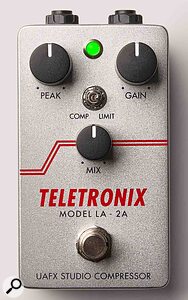Universal Audio have once again expanded their highly-regarded line of UAFX guitar pedals, with the latest four additions to the range offering a mix of amp modelling, dynamics and effects processing.
Lion ’68 Super Lead Amp
The first pedal focuses on emulating the sound of classic British amps, aiming for the tones of artists such as Led Zeppelin, Van Halen, Jimmy Hendrix, AC/DC and more. Lion ’68 Super Lead Amp models not just one but three 100W plexi amps, with a switch on the top panel offering Super Lead, Super Bass and Brown modes. There is also onboard cabinet, mic and room modelling derived from the company’s OX Amp Top Box, although they can be bypassed if required — for using the pedal in front of a different amp, for example.
There are three cabinet models included as standard, with another three available to download upon product registration. Plenty of hands-on control is provided, with access to parameters such as volumes, EQ, amp and cabinet model switching all available on the top panel, but the pedal also pairs with the UAFX mobile app in order to customise the footswitches and access additional, in-depth settings.
Stereo I/O is provided by four quarter-inch TS sockets, and 9V DC power is accepted via a standard 2.1mm socket.
Teletronix LA-2A Studio Compressor
 Having recently gained a pedal version of the 1176, the UAFX range is now equipped with another iconic studio unit, this time in the form of the Teletronix LA-2A Studio Compressor. Promising to enhance instruments like no other compressor, the device captures the sound of the original hardware and delivers it in a compact, pedalboard-friendly format. The entire signal path of an original unit has been carefully emulated, with its valves, transformers and optical cell distortions said to elevate an instrument’s tone even when no compression is being applied.
Having recently gained a pedal version of the 1176, the UAFX range is now equipped with another iconic studio unit, this time in the form of the Teletronix LA-2A Studio Compressor. Promising to enhance instruments like no other compressor, the device captures the sound of the original hardware and delivers it in a compact, pedalboard-friendly format. The entire signal path of an original unit has been carefully emulated, with its valves, transformers and optical cell distortions said to elevate an instrument’s tone even when no compression is being applied.
Peak, Gain and Mix controls are provided on the top panel, along with a switch to select compression or limiting modes. It also offers switchable buffered or true bypass operation, and a choice of two different attack times. A pair of quarter-inch TS sockets provide the input and output connections, and once again, 9V DC power is accepted via a standard 2.1mm socket.
Flow Vintage Tremolo
 The next pedal is said to have evolved from the flagship Astra Modulation Machine, and provides three different valve amp tremolo effects that cover a wide range of vintage and modern sounds.
The next pedal is said to have evolved from the flagship Astra Modulation Machine, and provides three different valve amp tremolo effects that cover a wide range of vintage and modern sounds.
Flow Vintage Tremolo comes equipped with three switchable modes: Dharma, which offers a harmonic tremolo effect; 65, a sine wave-based tremolo; and Square, which as you may have guessed, utilises a square wave to offer a ‘choppier’ sound.
Hands-on controls for the pedal's Speed, Depth and Volume parameters are provided on the top panel, along with a three-way toggle switch to select the different effects modes. The speed of the effect can be controlled via a tap tempo function, which is selectable via a switch placed on the rear panel. I/O and power connectivity taken care of by two quarter-inch TS sockets and a 2.1mm DC power socket.
Brigade Chorus & Vibrato
 The final pedal provides another emulation of a sought-after classic device, the Boss CE-1 Chorus Ensemble. UA say that the Brigade Chorus & Vibrato perfectly captures the bucket-brigade circuit of an original unit, delivering a selection of thick chorus and vibrato effects, as well as the sound of its analogue preamp — which can be toggled on or off thanks to a switch placed on the rear panel.
The final pedal provides another emulation of a sought-after classic device, the Boss CE-1 Chorus Ensemble. UA say that the Brigade Chorus & Vibrato perfectly captures the bucket-brigade circuit of an original unit, delivering a selection of thick chorus and vibrato effects, as well as the sound of its analogue preamp — which can be toggled on or off thanks to a switch placed on the rear panel.
Rate, Depth and Level controls occupy the top panel, along with a toggle switch for the Vibrato and Chorus modes, and the pedal can be configured to operate in buffered or true bypass modes. Power and signal connectivity is, unsurprisingly, taken care of by the same combination of TS and DC power sockets as the previous pedals!
Pricing & Availability
All of the new pedals are available now, with pricing as follows:
- Lion ’68 Super Lead Amp: $399
- Teletronix LA-2A Studio Compressor: $199
- Flow Vintage Tremolo: $199
- Brigade Chorus & Vibrato: $199
More info: www.uaudio.com/guitar-pedals.html

